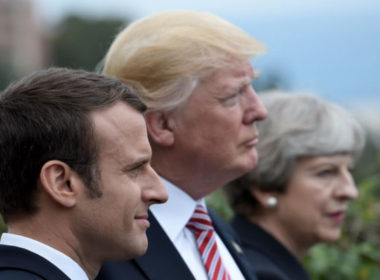The US-UK-France Strikes on Syria Didn’t Ignite World War III, but They Did Confirm the “New Cold War”

There are differing motivations that drove the US, UK, and France to bomb Syria.
Most people have already heard a lot of commentary about the US’ reasons for doing so, which were mostly to send a signal to Iran & Hezbollah as well as push the limits of what Russia will allow it to do in Syrian airspace, though comparatively less has been said about why the UK and France decided to tag along. London is caught up in post-Brexit domestic political chaos and is looking for a convenient distraction, especially since the Skripal case has begun to unravel and be exposed as the false flag chemical weapons attack that Russia has insisted it was all along. The UK also wants to retain its international relevance after global media mostly succeeded in convincing the masses that the country will become less important on the world stage after Brexit.
Another factor behind the UK’s decision to take part in these strikes was that France was very enthusiastic about them and was pining to lead the charge. London doesn’t want to lose out on its so-called “special relationship” with Washington to its historical Paris rival, which has been keen to present itself as the US’ chief EU ally given the fraying of relations between America and Germany for ideological and economic reasons. France is the only European power whose former colonial holdings could compete with the UK’s in geographic scope, and it’s eager to reestablish itself as a globally important Great Power through its recent diplomatic-military forays in the Mideast as judging by Macron’s intervention during the Hariri episode and his recent dispatch of troops to northern Syria.

The United Nations Security Council
Altogether, the combination of American, British, and French participation in the latest Syrian strikes importantly comprises 3/5 of the UNSC members who symbolically represent the West in the eyes of the world. Germany, while important, is pretty much only an EU power and doesn’t have a legacy of influence outside of the continent like the other three Great Powers do. The three aforementioned Western states stand in opposition to Russia, Iran, and China both in the context of what just took place last weekend and also more broadly, thus allowing one to more or less define the general geopolitical contours of what even the UN Secretary General recently acknowledged is a New Cold War, albeit this time between proponents of the unipolar and multipolar systems of International Relations instead of the capitalist and communist ideologies.
Last week’s hysterical hype about the supposedly imminent commencement of “World War III” and the nuclear apocalypse that people were being conditioned for manipulative reasons to expect right afterwards never came to pass, but all the same, there’s an unmistakable worldwide struggle going on for the future of International Relations. The US, the UK, and France are leading the unipolar camp while Russia, Iran, and China are doing the same with the multipolar one, though it must be stressed that all the members from each side aren’t in “perfect harmony” with one another and that some differences still remain. Having said that, while there are many proxy battlefields and even intangible domains in which this global competition is being waged, Syria is by far the most important of them, which is why last weekend’s escalations were so significant.
*
This article was originally published on Oriental Review.
Andrew Korybko is an American Moscow-based political analyst specializing in the relationship between the US strategy in Afro-Eurasia, China’s One Belt One Road global vision of New Silk Road connectivity, and Hybrid Warfare. He is a frequent contributor to Global Research.
The Globalization of War: America’s “Long War” against Humanity
Michel Chossudovsky
The “globalization of war” is a hegemonic project. Major military and covert intelligence operations are being undertaken simultaneously in the Middle East, Eastern Europe, sub-Saharan Africa, Central Asia and the Far East. The U.S. military agenda combines both major theater operations as well as covert actions geared towards destabilizing sovereign states.
- ISBN Number: 978-0-9737147-6-0
- Year: 2015
- Pages: 240 Pages
List Price: $22.95


